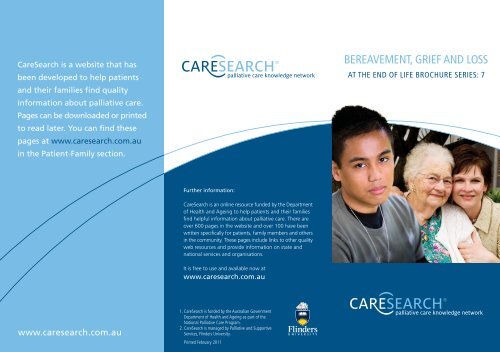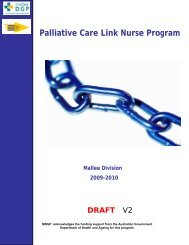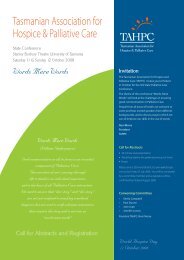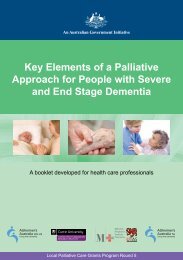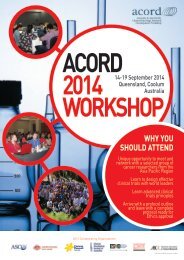Bereavement, grief and loss - CareSearch
Bereavement, grief and loss - CareSearch
Bereavement, grief and loss - CareSearch
Create successful ePaper yourself
Turn your PDF publications into a flip-book with our unique Google optimized e-Paper software.
Shock <strong>and</strong> distress are common whensomeone dies, even if it is an expecteddeath after a long illness. The deathof that person changes things forever.Each individual will react differentlywhen someone dies <strong>and</strong> there is noright or wrong way to grieve.GRIEF AND SADNESSPeople are often quite shocked in the weeksfollowing the death of a loved one. For some, itcan lead, at least for a time, to all consuming<strong>grief</strong> <strong>and</strong> sadness. Coping with <strong>grief</strong> <strong>and</strong> <strong>loss</strong>often requires a substantial emotional <strong>and</strong> physicaleffort <strong>and</strong> can sometimes be overwhelming.After someone has died, people may avoidmentioning them for fear of causing distress.However, sometimes taking the initiative <strong>and</strong>talking about the person who has died can be arelief. It can help family <strong>and</strong> friends feel morecomfortable talking about what has happened<strong>and</strong> how they are feeling.CHILDREN AND GRIEFChildren grieve in different ways from adults.Grief may affect their behaviour, the way in whichthey take in information, <strong>and</strong> their need forsupport. How they respond to the <strong>loss</strong> will dependon whether they are a child or teenager, theirage, <strong>and</strong> their emotional maturity. It will alsodepend on who has died, how they died, <strong>and</strong>the child’s relationship with them.LOSS OF A CHILDLosing a child is devastating for the parents <strong>and</strong>for the rest of the family. No amount of awarenessof the impending <strong>loss</strong> prepares a parent or otherfamily members for when it actually happens.Parental <strong>grief</strong> has been described as being moreintense than <strong>grief</strong> in response to any other <strong>loss</strong>es,regardless of the age of the child.SEEKING HELPSometimes, if <strong>grief</strong> is overwhelming, people mayneed professional help to cope with their <strong>grief</strong><strong>and</strong> <strong>loss</strong>. There are resources in the communitythat can be used to support those needing help.RECOVERING AND REMEMBERINGOften following a death, people take time toreflect on <strong>and</strong> to acknowledge the person’s life.It is comforting to think that those who havedied still have a voice, a story, or a connectionthat remains behind with those who love them.There are different ways in which to rememberthe person who has died. Although sadness <strong>and</strong><strong>loss</strong> will still be there, it is important to remember<strong>and</strong> share happy moments also.There are a number of <strong>grief</strong>, <strong>loss</strong> <strong>and</strong>bereavement resources on the <strong>CareSearch</strong>website that can help.


